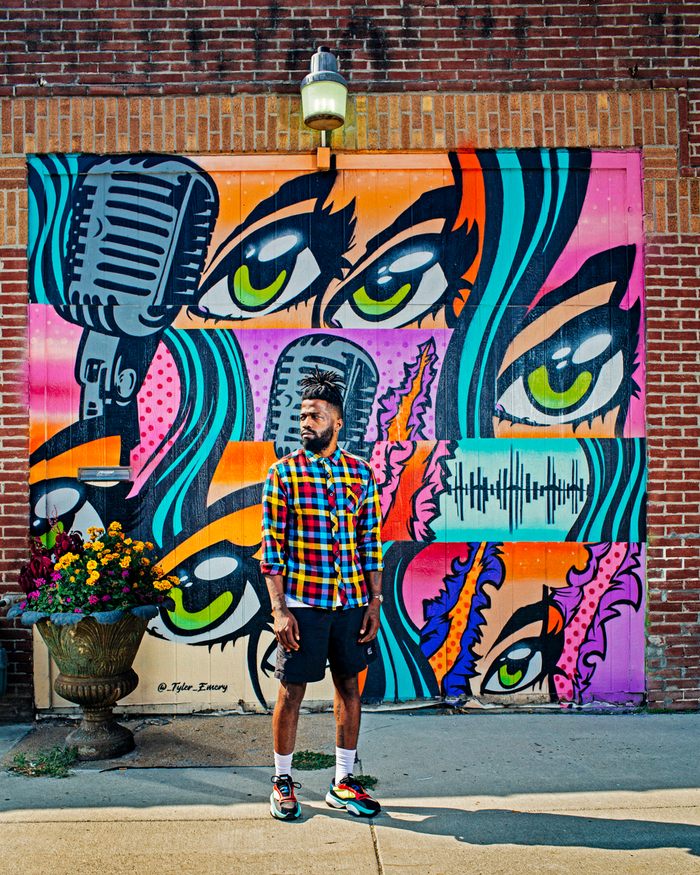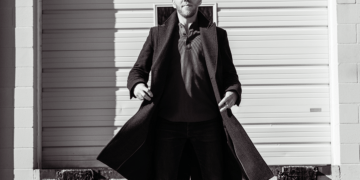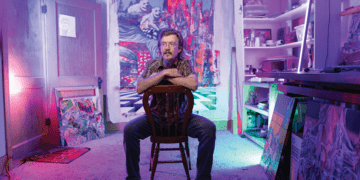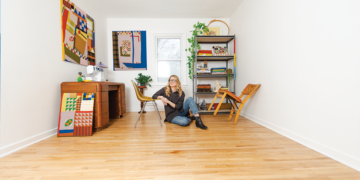Black artists ranging from the poet Langston Hughes, to musician Nina Simone, to the filmmakers of Black Panther have asked similar questions for generations, “What would we have been without colonialism and enslavement? What is it like to create while surrounded by our own culture?”
“I wonder what it would be to just be able to create because you’re free, you know what I mean?” said Ja Keen Fox, explaining that Black artists often create work from the perspective of being an “other” rather than being in a place of empowerment or belonging.
Until recently, Fox worked full-time as a program officer with the Weitz Family Foundation. He spends countless hours as a community organizer at Culxr House [pronounced “culture”]. It was envisioned and founded by hip-hop artist Marcey Yates as an artistic and entrepreneurial incubator.
“X is always like…a revolutionary kind of thing for me,” Yates said, explaining the name. Besides, “If you go with straight ‘culture’ it would be hard to find if you Google-searched it, you know what I’m saying?”
Located along a historic stretch of North 24th Street, the nonprofit became an organizing force behind peaceful demonstrations for racial equity in the city.
“North Omaha isn’t forgotten,” Fox said. “It’s just talked about in a really horrible way and Marcey has always had the awareness to say, ‘How do we change that narrative,’ to talk about what’s positive and talk about that space for more positive things to happen.”
Fox took a leadership role when Culxr House partnered with the ACLU to train participants for protests outside the residence of County Attorney Don Kleine. He also created a pocket guide so protesters could know their rights. The demonstrations focused on Kleine’s decision not to charge bar owner Jake Gardner in the shooting death of James Scurlock.
“It ended up going for 36 days and the last day we made it inside the gated community, right in front of Don Kleine’s house. He came outside, so it was worth the ‘series finale,’ you know,” Yates said. “It made a difference because, though this was put together through an unfortunate situation…what’s come out of it has been unique—understanding, less hate amongst certain people. New relationships have developed, new friendships, new policies on the table…More people are getting encouraged to step up.” He added that people also are attending more city council meetings and writing their senators and policy makers.
Founded in 2018 by Yates, Culxr House was established as a nonprofit in 2019. The neighborhood is also home to Love’s Jazz & Arts Center and The Union for Contemporary Art. Visitors are welcomed with a colorful mural on the outside of a simple, single story building.
“I love it. I love how authentic it is. I love how hip-hop it is. I love how much it embraces the culture. I love that space,” said Joshua Crum, an Omaha-based hip-hop artist and pastor known by his stage name, J. Crum.
Inside, colorful contemporary art is displayed on the walls and furniture is placed throughout the space for meeting and socializing. Toward the back of the room is a stage and sound system for performances, as well as a small recording studio. Yates said the organization has grown organically, depending on needs within the community.
“We started attracting different people with different interests and I tried to just recognize that and make sure that we could cater to that,” Yates explained.
Fox called the arrangement a “holistic” approach to community and economic development. He emphasized the importance of Black artists and activists having their work and their experiences centered in a creative space.
“Marcey, again, has done a great job of creating a space where everyone feels welcome, knowing that they need to honor what is historically Black [about the community] and center that appreciation in what they create and do here,” said Fox, mentioning that people from all cultural groups are welcome.
“We had the monks, like Buddhist monks who were on tour. They stopped by and blessed the place and you know, again, I felt like we were housing different cultures for different things and different events,” Yates said. “That’s really how it got started…off the strength of having a lot of cultures come through this place.”
Sensing a need for connection after months of quarantine, the team at Culxr House hosted an event on Juneteenth (June 19) with open mic performances. Masks were required indoors.
“Most of it was outside to be kind of social-distanced,” Fox said. “Everyone had masks on and would go up, take their masks off to sing and then put it right back on.”
The organization is also hosting open mic nights on Tuesdays, with safety precautions in place.
“Because again, mental health is very important,” Yates said. “[COVID-19] is a mental strain and this is something that we’re not used to. So just being mindful of that, staying aware, and trying to just reintegrate some of the things that were familiar before four months ago. That helps a bit.”
The Culxr House community believes artistic expression cannot be separated from political activism. Yates began college as a political science and communications student at UNO before he transferred to the Conservatory of Recording Arts and Sciences in Arizona.
“I’ve always had a focus on how government and economics work,” he said.
Yates said that the ACLU training was key to keeping participants safe during protests. Crum said he led a couple of shifts outside Kleine’s house and appreciated the guidance.
“For the demonstrations, we wanted to protest where we could have the most impact. And what I loved about this particular protest—as opposed to a lot of other ones—it was very, very organized,” said Crum, who explained that demonstrators stayed focused on their cause.
Crum, who has a degree in biblical studies, was also using Culxr House to plant a new worship space in the neighborhood, Slingshot Church. Since quarantine, he said they’ve moved the services online but will resume in person when it’s safe.
“Culxr House is amazing, it needs to be supported.”
The organization was busy this fall with a number of projects, including a street festival, get-out-the-vote canvassing efforts, a social media lab for ‘young influencers,’ and new partnerships.
“Two things I’m really excited about. We have a production that we’re working on with The Rose Theater and also we have a record album that we’re working on with Saddle Creek Records,” Yates said.
As it grows and more people are involved, Yates said he’s no longer putting in the 14-hour days as he was in the beginning, but “you gotta put that much work into it to get other people to believe that this is something to buy into.”
If the amount of community activity is any indication, Yates’ substantial investment of time is starting to bear fruit.
Visit culxr.house for more information.
This article was printed in the November/December 2020 edition of Omaha Magazine. To receive the magazine, click here to subscribe.














